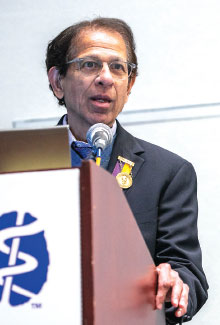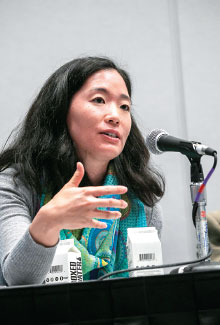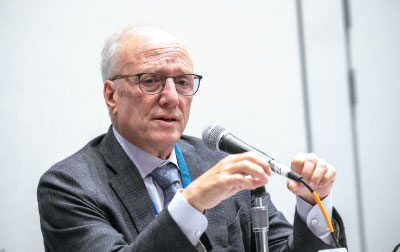Interventions That Promote Wisdom May Help Patients With Psychiatric Conditions
Abstract
While the study of wisdom is still in its infancy, researchers believe understanding the biological and psychosocial variables associated with wisdom can inform treatments.
Wisdom, long the domain of religion and philosophy, is now the subject of considerable neurobiological and psychiatric research because of increasing evidence linking traits of wisdom to health and wellness, said past APA President Dilip Jeste, M.D., during a symposium at the APA Annual Meeting in May.

Dilip Jeste, M.D., says the study of wisdom is in its infancy, and researchers are just now beginning to develop scales to measure it.
Moreover, wisdom can be a potent antidote to the growing loneliness epidemic, added Jeste, the senior associate dean for healthy aging and senior care, distinguished professor of psychiatry and neurosciences, and director of the Sam and Rose Stein Institute for Research on Aging at the University of California, San Diego.
The study of wisdom is an aspect of “positive” psychiatry, for which Jeste has been a champion. In the 2009 JAMA article “The Neurobiology of Wisdom,” Jeste and co-author Thomas Meeks, M.D., reported that search results for the keyword “wisdom” increased sevenfold from the 1970s through 2008 in PubMed, a public medical database.
In the course of their research, Jeste and Meeks identified six components of wisdom:
Prosocial behavior, or socially positive behaviors like empathy, compassion, and altruism
Social decision-making, or the ability to make decisions effectively in complex social situations
Self-reflection, or insight
Healthy impulse control and emotional regulation
Decisiveness during uncertainty
Spirituality
“There have been genetic and epigenetic studies of other positive traits, especially resilience,” Jeste said at the symposium. “The study of wisdom is in its infancy, and researchers are just now beginning to develop scales to measure wisdom and to look at the neurobiological correlates of wisdom and its attributes.

Ellen Lee, M.D., presents evidence indicating that wisdom is modifiable and can be enhanced by certain focused interventions.
“My sense is that you will see the same things [as have been found in research on resilience and other positive traits]. That is, wisdom will be shown to be about 50% heritable, and about 50% will be affected by the environment. And one’s behavior can have an impact on wisdom.”
Jeste was joined at the symposium by Bruce Miller, M.D., the A.W. and Mary Margaret Clausen Distinguished Professor in Neurology at the University of California, San Francisco (UCSF), director of the UCSF Memory and Aging Center, and a co-director of the Global Brain Health Institute. His research on frontotemporal dementia (FTD), a class of degenerative diseases affecting the brain’s frontal and temporal lobes, shows that specific brain circuits appear to be associated with empathy, prosocial instincts, and other aspects of wisdom and that these are lost in patients with FTD.
“Almost all of the neurodegenerative diseases begin with psychiatric problems, which I believe represent the prodrome in neurodegenerative disease,” Miller said. “Mood and anxiety symptoms have been assumed to be responses to [dementia], but I believe they really reflect the underlying biology of the neurodegenerative illness.”
He said research is beginning to reveal the specific brain regions and neuronal circuits associated with loss of wisdom in neurodegenerative disease. “We think it begins in very specific neurons and spreads out along microcircuits affecting the entire prefrontal cortex,” he said.
Ellen Lee, M.D., a third-year postdoctoral research fellow in geriatric mental health in the Department of Psychiatry at UCSD, presented evidence indicating that wisdom is modifiable and can be enhanced by certain focused interventions. She cited an article by Jeste published online last year titled “You Can Actually Learn to Be Wise and It Can Help You Feel Less Lonely.”

Neurologist Bruce Miller, M.D., says research is beginning to reveal the specific brain regions and neuronal circuits associated with loss of wisdom in neurodegenerative disease.
Lee reported her analysis of 55 randomized, controlled trials of interventions aimed at various components of wisdom: 27 studies examining interventions for prosocial behaviors, 13 studies focusing on emotional regulation, and 15 studies aimed at encouraging spirituality.
She described a “self-compassion” intervention for people with binge-eating behaviors that combined an online slide presentation about self-compassion, guided self-imagery exercises, and a daily homework schedule that included writing a self-compassion letter to oneself and managing urges to eat through visualization of self-compassion. Compared with a behavioral intervention that prescribed a food schedule, the self-compassion intervention improved overall measures of self-compassion and modulated some of the behaviors related to binge eating.
A second intervention Lee described involved using computer games to teach emotional-regulation strategies to children aged 8 to 10 years old with autism spectrum disorder. Parent-rated outcome measures indicated that the intervention significantly improved emotional regulation and social behavior.
And a third example Lee described was a spirituality intervention for patients on methadone maintenance to prevent high-risk behaviors associated with HIV/AIDS—such as unsafe sexual practices, drug use, and needle sharing, among others. It included eight weekly sessions in either group or individual sessions using cognitive- behavioral therapy based on Buddhist principles of doing no harm in speech or action. Lee said the intervention significantly increased daily spiritual practice and decreased those risk behaviors associated with HIV.
“Based on our overall review of the literature, I believe we can enhance wisdom, with some caveats,” Lee said. “We want to explore further the inverse relationship between loneliness and wisdom and try to understand the biological and psychosocial variables associated with wisdom and how it relates to physical well-being.” ■



